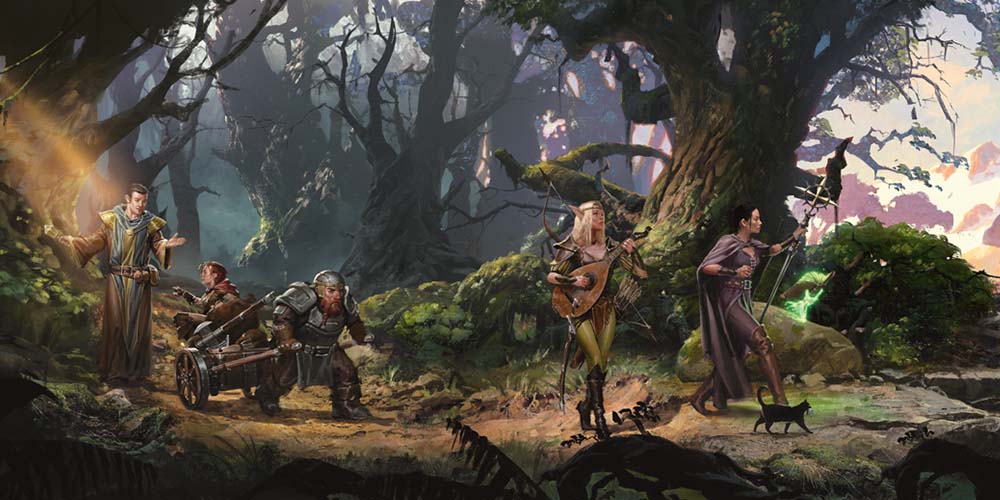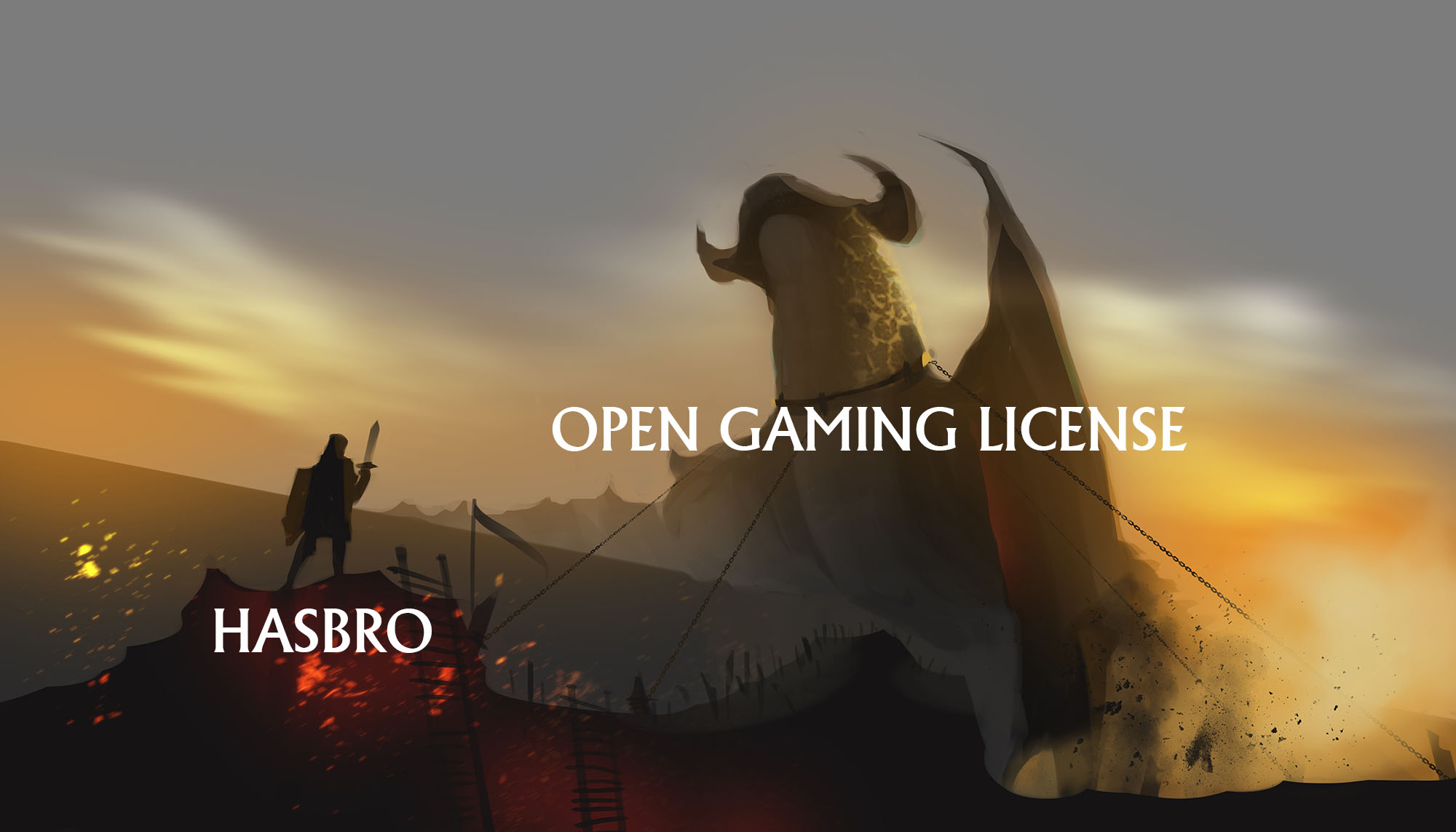There has been a lot of speculation recently about WotC's plans regarding the Open Gaming License and the upcoming One D&D. Today, WotC shared some information.
In short, they will be producing a new Open Gaming License (note that the previous OGL 1.0a will still exist, and can still be used). However, for those who use the new OGL 1.1, which will be released in early 2023, there will be some limitations added with regards the type of product which can use it, and -- possibly controversially -- reporting to WotC your annual OGL-related revenue.
They are also adding a royalty for those third party publishers who make more than $750K per year.
Interestingly, only books and 'static electronic files' like ebooks and PDFs will be compatible with the new OGL, meaning that apps, web pages, and the like will need to stick to the old OGL 1.0a.
There will, of course, be a lot of debate and speculation over what this actually means for third party creators, and how it will affect them. Some publishers like Paizo (for Pathfinder) and others will likely simply continue to use the old OGL. The OGL 1.0a allows WotC to update the license, but allows licensees to continue to use previous versions "to copy, modify and distribute any Open Game Content originally distributed under any version of this License".

 www.dndbeyond.com
www.dndbeyond.com

1. Will One D&D include an SRD/be covered by an OGL?
Yes. First, we’re designing One D&D with fifth edition backwards compatibility, so all existing creator content that is compatible with fifth edition will also be compatible with One D&D. Second, we will update the SRD for One D&D as we complete its development—development that is informed by the results of playtests that we’re conducting with hundreds of thousands of D&D players now.
2. Will the OGL terms change?
Yes. We will release version 1.1 of the OGL in early 2023.
The OGL needs an update to ensure that it keeps doing what it was intended to do—allow the D&D community’s independent creators to build and play and grow the game we all love—without allowing things like third-parties to mint D&D NFTs and large businesses to exploit our intellectual property.
So, what’s changing?
First, we’re making sure that OGL 1.1 is clear about what it covers and what it doesn’t. OGL 1.1 makes clear it only covers material created for use in or as TTRPGs, and those materials are only ever permitted as printed media or static electronic files (like epubs and PDFs). Other types of content, like videos and video games, are only possible through the Wizards of the Coast Fan Content Policy or a custom agreement with us. To clarify: Outside of printed media and static electronic files, the OGL doesn’t cover it.
Will this affect the D&D content and services players use today? It shouldn’t. The top VTT platforms already have custom agreements with Wizards to do what they do. D&D merchandise, like minis and novels, were never intended to be part of the OGL and OGL 1.1 won’t change that. Creators wishing to leverage D&D for those forms of expression will need, as they always have needed, custom agreements between us.
Second, we’re updating the OGL to offer different terms to creators who choose to make free, share-alike content and creators who want to sell their products.
What does this mean for you as a creator? If you’re making share-alike content, very little is going to change from what you’re already used to.
If you’re making commercial content, relatively little is going to change for most creators. For most of you who are selling custom content, here are the new things you’ll need to do:
For the fewer than 20 creators worldwide who make more than $750,000 in income in a year, we will add a royalty starting in 2024. So, even for the creators making significant money selling D&D supplements and games, no royalties will be due for 2023 and all revenue below $750,000 in future years will be royalty-free.
Bottom line: The OGL is not going away. You will still be able to create new D&D content, publish it anywhere, and game with your friends and followers in all the ways that make this game and community so great. The thousands of creators publishing across Kickstarter, DMsGuild, and more are a critical part of the D&D experience, and we will continue to support and encourage them to do that through One D&D and beyond.
In short, they will be producing a new Open Gaming License (note that the previous OGL 1.0a will still exist, and can still be used). However, for those who use the new OGL 1.1, which will be released in early 2023, there will be some limitations added with regards the type of product which can use it, and -- possibly controversially -- reporting to WotC your annual OGL-related revenue.
They are also adding a royalty for those third party publishers who make more than $750K per year.
Interestingly, only books and 'static electronic files' like ebooks and PDFs will be compatible with the new OGL, meaning that apps, web pages, and the like will need to stick to the old OGL 1.0a.
There will, of course, be a lot of debate and speculation over what this actually means for third party creators, and how it will affect them. Some publishers like Paizo (for Pathfinder) and others will likely simply continue to use the old OGL. The OGL 1.0a allows WotC to update the license, but allows licensees to continue to use previous versions "to copy, modify and distribute any Open Game Content originally distributed under any version of this License".
OGLs, SRDs, & One D&D
We love the interest and passion the community has for D&D. We love D&D, too. So, when we see the D&D community concerned by rumors and misu...
1. Will One D&D include an SRD/be covered by an OGL?
Yes. First, we’re designing One D&D with fifth edition backwards compatibility, so all existing creator content that is compatible with fifth edition will also be compatible with One D&D. Second, we will update the SRD for One D&D as we complete its development—development that is informed by the results of playtests that we’re conducting with hundreds of thousands of D&D players now.
2. Will the OGL terms change?
Yes. We will release version 1.1 of the OGL in early 2023.
The OGL needs an update to ensure that it keeps doing what it was intended to do—allow the D&D community’s independent creators to build and play and grow the game we all love—without allowing things like third-parties to mint D&D NFTs and large businesses to exploit our intellectual property.
So, what’s changing?
First, we’re making sure that OGL 1.1 is clear about what it covers and what it doesn’t. OGL 1.1 makes clear it only covers material created for use in or as TTRPGs, and those materials are only ever permitted as printed media or static electronic files (like epubs and PDFs). Other types of content, like videos and video games, are only possible through the Wizards of the Coast Fan Content Policy or a custom agreement with us. To clarify: Outside of printed media and static electronic files, the OGL doesn’t cover it.
Will this affect the D&D content and services players use today? It shouldn’t. The top VTT platforms already have custom agreements with Wizards to do what they do. D&D merchandise, like minis and novels, were never intended to be part of the OGL and OGL 1.1 won’t change that. Creators wishing to leverage D&D for those forms of expression will need, as they always have needed, custom agreements between us.
Second, we’re updating the OGL to offer different terms to creators who choose to make free, share-alike content and creators who want to sell their products.
What does this mean for you as a creator? If you’re making share-alike content, very little is going to change from what you’re already used to.
If you’re making commercial content, relatively little is going to change for most creators. For most of you who are selling custom content, here are the new things you’ll need to do:
- Accept the license terms and let us know what you’re offering for sale
- Report OGL-related revenue annually (if you make more than $50,000 in a year)
- Include a Creator Product badge on your work
For the fewer than 20 creators worldwide who make more than $750,000 in income in a year, we will add a royalty starting in 2024. So, even for the creators making significant money selling D&D supplements and games, no royalties will be due for 2023 and all revenue below $750,000 in future years will be royalty-free.
Bottom line: The OGL is not going away. You will still be able to create new D&D content, publish it anywhere, and game with your friends and followers in all the ways that make this game and community so great. The thousands of creators publishing across Kickstarter, DMsGuild, and more are a critical part of the D&D experience, and we will continue to support and encourage them to do that through One D&D and beyond.




